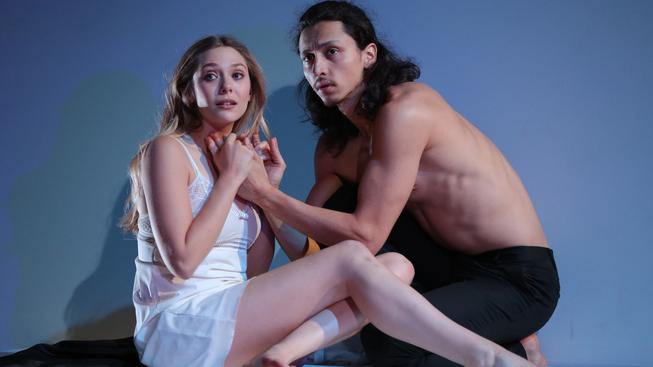Tea Alagić’s production of ROMEO AND JULIET at Classic Stage Company is in the tradition of Peter Brook’s “empty space.” I can almost imagine that seminal figure of the modern theater as having directed it. The script is pared to its essence, to just the point at which trimming a little more would do injury to it as a coherent drama. The stage – in Marsha Ginsberg’s design – is bare, except for a row of chairs and a couple of tables that are pressed against the back wall as though put there to clear the space. The costumes are for the most part contemporary street clothes; Elizabeth Olsen’s Juliet spends half of the play in lace-up boots and the other half in bare feet.
There are now and then little bursts of Spanish amidst Shakespeare’s language, pinprick reminders of how interconnected our nation’s cultures are becoming. Yet it does not feel as though ethnicity is the source of the Montague-Capulet feud that ends in the deaths of their offspring. This is no WEST SIDE STORY fable of ethnic resentment, but something deeper and yet more straightforward. There are those who control, those who seek to pursue their desires independent of that control, and those who abet one or the other.
What Alagić has driven home for me is the extent to which Friar Laurence, not Romeo and not Juliet, is the tragic protagonist of the play. It is he who is basically good but flawed, by a deluded confidence in his own ability to control both people and events. Who but he could imagine that the complicated plot he sets in motion to aid the lovers, first in marriage and then in elopement, with potions and burials and breathless messengers, could turn out well? When Daniel Davis – who as Laurence has a strong forward lean, like that of a tango dancer, as he declaims the verse – is given, as the play’s final line, “All are punishéd,” one feels that it is the Friar who feels the most punished, having destroyed those he thought to help with his arrogance, inflexibility, and self-regard.
Davis’ dominance within the play’s tragic structure, and thus in its meaning, is well-supported by the armature of the players who surround him. As Juliet’s Nurse, Daphne Rubin-Vega delivers the sort of performance that arouses genuine affection; and T.R. Knight is a dissolute Mercutio who understands every word he says up to the point where, as Julian Cihi’s Romeo points out to him, they mean “nothing” and become ineffectual.
It is, though, Elizabeth Olsen who most profoundly inculcates both character and verse. She plays younger than she is (Juliet is only 14), not in a literal way, but in recognition that she represents an archetypal figure in the empty space of a fictional stage. What she conveys, as much as plays, is an adolescent girl, her toes pointing awkwardly inward, her body alive in every fiber of it, who glimpses and at times reveals the maturity that she senses inside of her, even as the force of events in the control of others threaten her very life. Olsen finds meaning not simply in the sentences she speaks (everyone in the cast knows what he or she is saying overall), but at the level of the syllable, and not only in the suppleness of her voice but in the expressive urges of her body.
I don’t know that I expected ever to see a ROMEO AND JULIET, Alagić’s, or a Juliet, Olsen’s, that would revitalize this all too familiar play. But each in her own way did. There is no triteness in the tale they tell, but instead the tragedy of what a naive and controlling elite – Laurence and the social tendency that he represents – does to an intelligent young woman on the verge of knowing herself as a strong person in the world, which, as though to prevent that from happening, destroys her.
For information about this and other productions at Classic Stage Company, click here. Image: CSC promotional photo.
